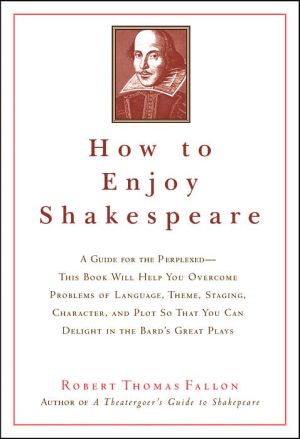

 |

|

The average rating for How to Enjoy Shakespeare based on 2 reviews is 3 stars.
Review # 1 was written on 2017-02-17 00:00:00 Marc Lasecki Marc LaseckiSadly, this book is just not that good. I am far from a Shakespeare scholar, but I enjoy his works and often read them on my own for fun. This can sometimes be a tough slog without a knowledgeable guide to refer to when something is difficult to understand. Throughout my amateur Shakespeare efforts I have also occasionally come across little tips and background pieces of information that inform deeper meaning and enjoyment of his works. For example, someone once told me that Shakespeare often has characters exit on a rhyming couple. I had never noticed before, but once you know to look for it, it adds a surprising amount of enjoyment to your reading and watching of his plays. That is not mentioned in this book, and neither is much else. It's more that the author wants to impress us with the fact that he's read and understood all of Shakespeare's works. "Shakespeare wrote about relationships. One such relationship is that between fathers and sons. Allow me to list all the father/son pairs that appear in Shakespeare's works." Oh wow, really? Shakespeare wrote about human relationships? And that's what sets him apart from all the other writers of all time, is it? It's just filled with silly stuff like this that doesn't really help anyone understand Shakespeare anymore than they already do. I think literally everyone has caught on to the fact that the ghost is Hamlet's father, and that Cordelia is King Lear's daughter. It's all the other crap going on in those stories that people need help with. So, rather than read this book, ready my review. I've captured the only moderately interesting tips from it below: "Shakespeare employed rhyme more often in his early plays, but as he matured in his art he depended less upon it, preferring blank verse, which relies more on rhythm and imagery for effect." I find it kind of interesting to notice these kinds of contextual clues as I read or watch. "Shakespeare, as noted, was fond of drawing attention to poetic excess and to actors who overact. Nowhere does the parody such exuberance to comic effect so well as in the Pyramus and Thisbe episode in A Midsummer Night's Dream." It is definitely helpful to know that the whole Pyramus and Thisbe bit is supposed to be ridiculous. (A similar concept applies to Dogberry from Much Ado About Nothing. He is supposed to sound like a pompous idiot. That's the joke. Not mentioned in this mostly useless book, but an added freebie from me.) "The seasoned playgoer will be alert to Shakespeare's practice of concluding a long speech with a significant summing up." So if you're having trouble following a long stretch, just reread the last few lines a few times and you'll get the gist of the whole preceeding passage. The author also points out that plays were staged in the open air, with minimal aid of what we would now consider necessities of theater, like scenery, lighting, and effects. So you may notice that often characters refer to the sun or moon as a way of cluing the audience to the time of day of the scene and the weather, as in "Well met by moonlight, Proud Titania," and "Blow, winds, and crack your cheeks! Rage! Blow!" both of which would have been ideally uttered under a bright, cloudless sky. It's also worth noting that this applies to stage directions as well ... but the author doesn't. Note that, I mean. It's a basic tip for understanding Shakespeare that is missed, so I'll just throw it in from my own knowledge. There is very little in the way of stage direction ("Exit left, pursued by a bear" notwithstanding), because it is often embedded in the dialog, as in, "How now, Horatio, you tremble and look pale, " or "Upon my knees I charm you." I wish the whole book were full of these kinds of things, but it's not. Maybe I'll have to write my own book on the topic. :) |
Review # 2 was written on 2018-12-02 00:00:00 Charles Carroll Charles CarrollI thoroughly enjoyed reading this 100-page guide and realize that I was taught Shakespeare the wrong way, that is to say, the most common way of reading one play at a time. I was never given in overview of the various machinations of plot, character, imagery, etc. Consequently, I always found Shakespeare difficult to understand. With this guide, however, now I understand his basic devices, including language, and how his uncommon events (rise of empire, assassination, etc) and uncommon figures (dukes, kings, queens, generals) were really at their core just vehicles for expressing humanity: joys and sorrows, triumphs and defeats. My main qualm is that including a few figures-- especially of the characters--would have added some zest to the text. |
CAN'T FIND WHAT YOU'RE LOOKING FOR? CLICK HERE!!!